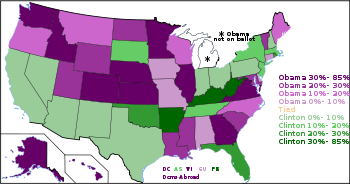| SVG version of 2008_Democratic_Primaries_Popular_Vote.png. Popular Vote Margins by State, US Democratic Presidential Primaries 2008 (Photo credit: Wikipedia) |
Take a look at the 2014 exit polls (CNN). You will see that among those without any religious affiliation, 69% voted for Democratic candidates and 29% voted for Republican candidates in House races. These numbers indicate that the majority of religiously unaffiliated voters do tend to vote for Democratic candidates; however, they also show that a significant number (29%) vote for Republicans.
It seems to me that we would do well to remember that while many of us do lean to the left, there is nothing inherent in atheism (or in not having a religious affiliation) that says that everyone must be political liberal and support Democratic candidates. Whether you want to call it an atheist movement, atheist community (or atheist communities), or something else entirely, it is clear that it will include people with a right-leaning political orientation.
When it comes to something as vital as preserving the separation of church and state, this liberal atheist is more than happy to welcome the involvement of other secular persons throughout the political spectrum. I do not require allegiance to any socio-political dogma in order to consider someone an ally in the struggle against religious privilege. Petty tribalism and litmus tests have undermined secular activism long enough. And besides, just because someone is more conservative than you or I might be on certain issues does not mean that we cannot still learn from them.
